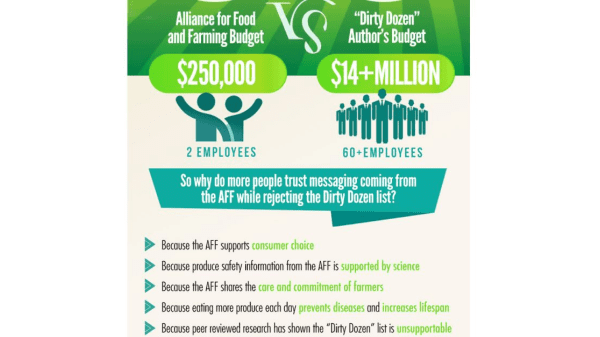
For over 25 years, the Environmental Working Group (EWG) has released its so-called “dirty dozen” list, which inaccurately disparages popular, affordable and more accessible fruits and vegetables.
Over the years, the Alliance for Food and Farming (AFF) has repeatedly asked EWG questions regarding this list. Interestingly, they never answer us. But we’re trying again.
• Peer reviewed science has repeatedly shown that the “dirty dozen” list is not scientifically credible, nor does the methodology used by EWG follow any established scientific procedures. Why do you continue to release a list that is not based on sound science?
• Peer reviewed science has shown that your recommendation to substitute organic forms of produce for conventional does not reduce risk for consumers because residues are so low on conventional produce, if present at all. In fact EWG, you clearly state this list does not address risk. From your report: “The Shopper’s Guide does not incorporate risk assessment into the calculations. All pesticides are weighted equally, and we do not factor in the levels deemed acceptable by the EPA.” Government sampling programs also repeatedly show that residues do not pose a safety concern. So, again, why would you continue to release this list when your recommendations aren’t scientifically supportable?
• Only one in 10 Americans eat enough fruits and vegetables each day. Decades of nutritional studies have shown these nutrient-dense foods improve immune function, prevent diseases and increase life span. If you sincerely care about consumers and public health, why would you continue to release this list when peer reviewed science shows its fear-based messaging has a negative impact on purchasing of any produce – organic or conventional – among low income consumers?
We admit we have really asked the same question using separate proof points. And there are even more scientific discrepancies, assertions, unsupportable claims by EWG that we could include here.
But let’s think about EWG’s own words from a pinned tweet. “Ignoring science might make reality more palatable for some, but it doesn’t change the facts.”
That’s correct EWG, but you are on the wrong side of that statement and your inability and unwillingness to answer our questions underscores this point.
Here’s the science, the reality and the facts: Decades of nutrition and toxicology studies and government sampling data consistently prove the health and safety of organic and conventional fruits and vegetables and the need to eat more every day.
Final question for EWG – Why not join health experts everywhere who agree that produce is the only food group they recommend we eat more of in our diets for better health – organic, conventional, local, home-grown – whatever consumers prefer?
It’s time to get on the right side of the science.
Learn more about the safety of all produce at safefruitsandveggies.com.
For over 25 years, the Environmental Working Group (EWG) has released its so-called “dirty dozen” list, which inaccurately disparages popular, affordable and more accessible fruits and vegetables.
Over the years, the Alliance for Food and Farming (AFF) has repeatedly asked EWG questions regarding this list. Interestingly, they never answer us. But we’re trying again.
• Peer reviewed science has repeatedly shown that the “dirty dozen” list is not scientifically credible, nor does the methodology used by EWG follow any established scientific procedures. Why do you continue to release a list that is not based on sound science?
• Peer reviewed science has shown that your recommendation to substitute organic forms of produce for conventional does not reduce risk for consumers because residues are so low on conventional produce, if present at all. In fact EWG, you clearly state this list does not address risk. From your report: “The Shopper’s Guide does not incorporate risk assessment into the calculations. All pesticides are weighted equally, and we do not factor in the levels deemed acceptable by the EPA.” Government sampling programs also repeatedly show that residues do not pose a safety concern. So, again, why would you continue to release this list when your recommendations aren’t scientifically supportable?
• Only one in 10 Americans eat enough fruits and vegetables each day. Decades of nutritional studies have shown these nutrient-dense foods improve immune function, prevent diseases and increase life span. If you sincerely care about consumers and public health, why would you continue to release this list when peer reviewed science shows its fear-based messaging has a negative impact on purchasing of any produce – organic or conventional – among low income consumers?
We admit we have really asked the same question using separate proof points. And there are even more scientific discrepancies, assertions, unsupportable claims by EWG that we could include here.
But let’s think about EWG’s own words from a pinned tweet. “Ignoring science might make reality more palatable for some, but it doesn’t change the facts.”
That’s correct EWG, but you are on the wrong side of that statement and your inability and unwillingness to answer our questions underscores this point.
Here’s the science, the reality and the facts: Decades of nutrition and toxicology studies and government sampling data consistently prove the health and safety of organic and conventional fruits and vegetables and the need to eat more every day.
Final question for EWG – Why not join health experts everywhere who agree that produce is the only food group they recommend we eat more of in our diets for better health – organic, conventional, local, home-grown – whatever consumers prefer?
It’s time to get on the right side of the science.
Learn more about the safety of all produce at safefruitsandveggies.com.
Teresa Thorne is Executive Director of the Alliance for Food and Farming



